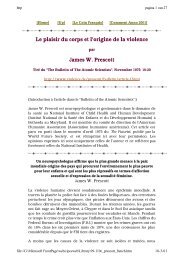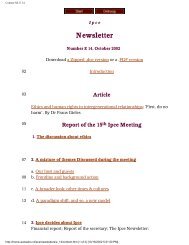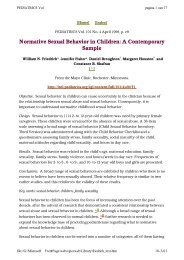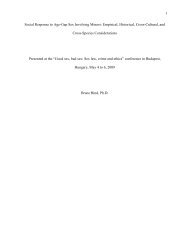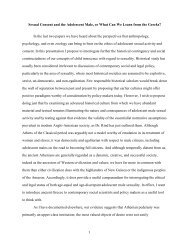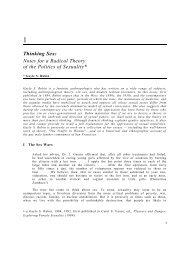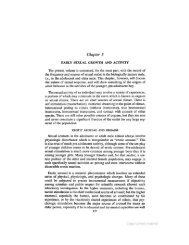Infant and Child Sexuality: A Sociological Perspective - Ipce
Infant and Child Sexuality: A Sociological Perspective - Ipce
Infant and Child Sexuality: A Sociological Perspective - Ipce
You also want an ePaper? Increase the reach of your titles
YUMPU automatically turns print PDFs into web optimized ePapers that Google loves.
1965, p. 225). <strong>Child</strong>ren often contribute to the parents’ felt need of<br />
secrecy by showing disgust or rejection of the sex displays of their<br />
parents. Young people often report that any sight of their parents<br />
showing affection toward each other embarrassed them as children.<br />
This is not always true. In the following case the child shows real<br />
appreciation of the father’s show of affection for the mother.<br />
My father tries to do whatever he can to make it<br />
easier <strong>and</strong> better for all of us. He shows many<br />
outward signs of love <strong>and</strong> affection toward my<br />
mother in the presence of us children. This is<br />
especially detectable by the way my father<br />
kisses my mother <strong>and</strong> the little things he says<br />
to her, which have no great meaning to us, but<br />
do to mother.<br />
But on balance, from survey data <strong>and</strong> from case histories we must<br />
conclude that whenever a young child in the United States engages verbally<br />
or physically in a sexual encounter with a parent the situation<br />
is usually one of conflict rather than accommodation, cooperation, <strong>and</strong><br />
affection. I suspect, however, that the case history sample based on<br />
recall is somewhat biased in that sexual encounters involving conflict<br />
provide more trauma <strong>and</strong> are indelibly etched on the memory when compared<br />
to sexual encounters that do not involve conflict, trauma or<br />
guilt.<br />
Most sexual encounters of children with their parents involve the<br />
parent not as a participant in the encounter but as an observer of a<br />
sexual encounter between the child <strong>and</strong> a peer. The parent often makes<br />
his appearance unexpectedly <strong>and</strong> puts a stop to the activity. (Litin, et<br />
al, 1956).<br />
The child also learns what the prevailing adult attitudes are toward<br />
sex even without parental interference in direct encounters. The<br />
tone of voice in which gossip is relayed warns him to avoid becoming a<br />
subject for similar gossip. The care <strong>and</strong> circumlocution with which certain<br />
matters of sex are avoided in books, in the press, <strong>and</strong> in other<br />
public communications subtly reminds the child of the state of public<br />
opinion on these matters. Discussions of such things as divorce, marital<br />
discord, the sexual sc<strong>and</strong>als of the community <strong>and</strong> the gossip about<br />
public figures probably have more influence in controlling the child’s<br />
behavior than any specific action that society may take or any legal<br />
penalties that are attached to those things. (Kinsey, 1948, p. 446).<br />
<strong>Child</strong>ren notice at an early age that certain topics may not be mentioned.<br />
They experience <strong>and</strong> become sensitized to the embarrassed <strong>and</strong><br />
critical attitudes displayed by adults whenever anything pertaining to<br />
sex comes up for discussion. They are frequently instructed not to repeat<br />
to outsiders any information given them about genital differences<br />
or child birth. (Conn, 1940).<br />
My problem was the modesty of my parents, especially<br />
my father, regarding sexuality <strong>and</strong> the<br />
existence of male <strong>and</strong> female bodies <strong>and</strong> their<br />
functions. If there were any possible chance<br />
that I might be in the area when my father was<br />
dressing, he made sure that the door was shut<br />
54



